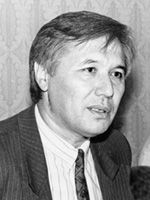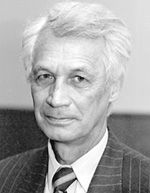Ukrainian science is in dire straits and the research personnel is aging. These are perhaps the two most serious problems facing the Ukrainian National Academy of Sciences (Ukr. abbr., NAN), with the first causing the second. When attending the annual NAN general assembly this year, I had the overall impression that from now on the causal connection will be reversed; the aging bulk of the NAN Academicians and Corresponding Members will have its effect on how the National Academy approaches its financial and other pressing problems. Approaches to the organization and performance in the top-level scientific realm, worked out under conditions of financial stability, prove totally ineffective given today’s economy with its unfinished reform projects, gripped by deep crisis. And what I heard from people taking the floor during the NAN convention only heightened my fears.
In terms of NAN progress, there are positive indices relating to fundamental studies in mathematics, computer science, physics, astronomy, and materials sciences. A number of studies have been carried out to predict adjustments in the political power structure and development of a multiparty system. Major emphasis has been placed on issues of “state-building.” Inter alia, NAN took part in drafting the President’s message to Parliament, stressing that the actual document put forth industrial adjustment as a precondition of overcoming the crisis. A number of theoretical developments have been implemented, including progressive steel-smelting techniques at the Illich and Azovstal Works. NAN has maintained effective cooperation with the Frunze Production Association and Novokramatorsk Machine-building Plant. The electrical energy industry, agrarian sector, and economy as a whole have presented problems dealt with by NAN and which the National Academy must constantly keep in view.
Talking of problems, the NAN’s ranking research staff is exposed to the inexorable process of aging (currently averaging 50 years). To combat this process, the Academy’s research centers practice “young scientific councils” and “commissions for work with youth.” Scientific schools and research trends are becoming extinct. This is particularly true of our electrochemistry school. Even though last year’s budget subsidies were implemented by only 72.8%, another million hryvnias less is planned for this year, UAH 165.8 million. On January 27, the President authorized a 1.5 research subsidy increment, but the bureaucrats ignored the order. Now an Academy member is paid an average of 186 hryvnias a month (compared to UAH 283 paid tax service personnel). “We have requested the government that they increase budget subsidies, but the Cabinet and NAN are apparently using different systems of coordinates.”
Another point occupying a special place on the agenda was pseudoscience, which was described as a “malignant parasite feeding on the glorious flesh of our sciences” (and no one laughed in the audience — Author] And the motto, “Fighting Obscurantism Is Our Moral Duty,” was likewise accepted.
Also a major note sounded by the orators were statements like, “The Academy will continue to make every effort for Ukraine’s economic and cultural rebirth” and “God grant that these seeds be sown, yielding good harvest on National Academy soil.”
In a word, everything happened at that NAN convention the way it had ten or twelve years ago when every such gathering would be opened with the Ukrainian SSR Academy President (and still NAN President — Ed.) reminding those present of the latest resolutions passed by Party congresses and plenums. This many speakers now referred to “epochal documents,” except that they mentioned presidential edicts and directives. The times have changed, but not so most of those taking the floor and presenting their spiel.
Surprisingly, most of those speaking at the NAN convention did not seem to realize that asking the President for larger budget subsidization sounded purely ritualistic. They should have first asked whether the state has enough money to sustain the National Academy of Sciences in its current status. Academician Ivan Chebanenko in his article carried by Den’ (No. 13, January 27, 2000, not carried by this digest) quotes striking statistics: over the past several years the number of those on NAN payroll has reached 75,000, with 170 research institutions, some 100 research-production associations (including 14 experimental works), 30 various R&D organizations, about 20 “special experimental and research enterprises, etc.
The Day asked several participants in the NAN meeting to comment on problems relating to the financing of Ukrainian science and its reorganization.
Yuri YEKHANUROV, First Deputy Premier, when asked about his attitude toward allegations that the Ukrainian government is not paying enough attention to financing domestic science and scholarship, said: “We have our budget for the year and are acting accordingly. Naturally, we are aware that the expenditures provided for do not suffice to finance all those research institutes. I will instruct the State Property Fund to take stock of unfinished research construction projects, jointly with the National Academy of Sciences. I think that such money could be an additional NAN source of financing.
“It is very important for us to keep at the budget finance level now, for we will not receive any significant returns from abroad in the second quarter. On the other hand, we are fully aware that investment in science is very profitable. The President’s current assignment of innovating priorities is especially important. That there are no capital investments envisioned means we must find finance sources using methods practiced everywhere else in the world. If you have a good idea you must find a way to sell it, make others interested in it so much so they will be willing to invest in it.”
The Day: “The National Academy is a large structure, having some 70,000 on its payroll. Considering Ukraine’s current economic status, do you think we can afford all this?”
Yekhanurov: “Understand, the state budget does not cover all that which must be covered in a country with 50 million people. Thus the Academy’s self-accounting entities are especially important. On the other hand, concentrated subsidization has to benefit those trends where Ukraine retains serious world priority status. Here we must make a real breakthrough: here we must channel our resources. As for the number of workers, I approach the subject very cautiously, for I don’t support rash staff reductions, although I was honestly perplexed to hear the statistics that academicians average 70 years of age and the corresponding members only a little less. I think that one of the nearest Cabinet meetings will pay close attention to the subject.”
Valery KUKHAR, NAN Academician: “The status of Ukrainian sciences, as you know, is getting worse. Clearly, only with state aid can science weather the crisis we are living through, and the state is aid is always declining, unfortunately. We must look for ways and means. But we must have a different attitude toward financing in the first place. Under the circumstances, the National Academy is turning into some sort of social protection bureau. All we get from the state by way financing suffices for our payroll. What about money for our laboratories? If the Academy is a priority for the state, as science in general, it has to be given enough money to support its material and technical basis. In terms of our laboratory equipment and that at the other research centers places Ukraine about 25 years behind the developed countries. Our scientists travel abroad not only to earn a better living. They are primarily interested in receiving an opportunity to conduct better, more fruitful research. We don’t have the money for scientific journals or computers. But the Internet has to be paid for, and there is no money, as is sometimes the case with our phone bills.”
Vitaly KORDIUM, Corresponding Member of NAN and the Academy of Medical Sciences of Ukraine: “There is no demand for science in our society. Bringing it out of crisis would become possible, in principle, only by getting this society out of its crisis. In fact, I can’t understand why we did not embark on a path requiring no budget aid. I mean why our government-run research centers are not allowed to become research-and-production companies. That way they would be entitled to do business without being suffocated by the existing taxes. In fact, science can be strengthened without budget subsidies (and we know that we will never get any), provided we have the right kind of legislation, laws allowing those in the scientific domain to earn money and sell their intellectual property.”
The Day: Our media now and then say that the National Academy is no longer a body capable of meeting the needs of the times; that it is too obsolete to bring our science out of its crisis. What do you think?
V.K.: This is not so if our current situation is compared with that in the West. To say that we make efforts to do this today would be is wrong in principle. We cannot tear our science away from our domestic conditions and make it function the way it does over there, using our available basis. The Academy of Sciences is currently the only structure capable of keeping our science alive one way or another. Without it our science would disappear within a year, for there would be no structure trying to somehow to maintain it. It’s just like an army: if taken apart as separate battalions and companies, it won’t be able to fight. We need some sort of headquarters, and the Academy plays this role.









